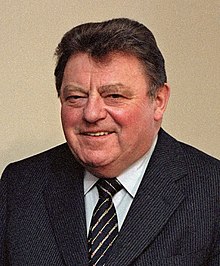Franz-Josef Strauss
| Franz Josef Strauss | |
|---|---|

Strauss in 1982
|
|
| Minister President of Bavaria | |
|
In office 6 November 1978 – 3 October 1988 |
|
| Preceded by | Alfons Goppel |
| Succeeded by | Max Streibl |
| Federal Minister of Finance | |
|
In office 2 December 1966 – 22 October 1969 |
|
| Preceded by | Kurt Schmücker |
| Succeeded by | Alex Möller |
| Federal Minister of Defence | |
|
In office 16 October 1956 – 16 December 1962 |
|
| Preceded by | Theodor Blank |
| Succeeded by | Kai-Uwe von Hassel |
| Federal Minister for Atomic Affairs | |
|
In office 21 October 1955 – 16 October 1956 |
|
| Succeeded by | Siegfried Balke |
| Federal Minister for Special Affairs | |
|
In office 1953–1955 |
|
| Personal details | |
| Born |
6 September 1915 Munich |
| Died | 3 October 1988 (aged 73) Regensburg |
| Nationality | German |
| Political party | CSU |
| Spouse(s) | Marianne Zwicknagl |
| Children | Max Josef Franz Georg Monika |
| Alma mater | University of Munich |
| Religion | Roman Catholicism |
| Signature |  |
Franz Josef Strauss (German: Franz Josef Strauß, IPA: [ˈfʁants ˈjoːzɛf ˈʃtʁaʊs]; 6 September 1915 – 3 October 1988) was a German politician. He was the chairman of the Christian Social Union, member of the federal cabinet in different positions and long-time minister-president of the state of Bavaria. Strauss is also credited as a co-founder of European aerospace conglomerate Airbus.
After the 1969 federal elections, West Germany's conservative alliance found itself out of power for the first time since the founding of the Federal Republic. At this time, Strauss became more identified with the regional politics of Bavaria. While he ran for the chancellorship as the candidate of the CDU/CSU in 1980, for the rest of his life Strauss never again held federal office. From 1978 until his death in 1988, he was the head of the Bavarian government. His last two decades were also marked by a fierce rivalry with CDU chairman Helmut Kohl.
Born in Munich on 6 April 1915, as the second child of a butcher, Strauss studied German letters, history and economics at the University of Munich from 1935 to 1939.
In World War II, he served in the Wehrmacht on the Western and Eastern Fronts. While on , he passed the German state exams to become a teacher. After suffering from severe frostbite on the Eastern Front in early 1943, he served as an Offizier für wehrgeistige Führung, relabelled in November 1943 Nationalsozialistischer Führungsoffizier (NSFO), both terms designating a political commissar responsible for the National Socialist education of the troops, at the antiaircraft artillery school in Altenstadt Air Base, near Schongau. He held the rank of Oberleutnant at the end of the war.
...
Wikipedia
